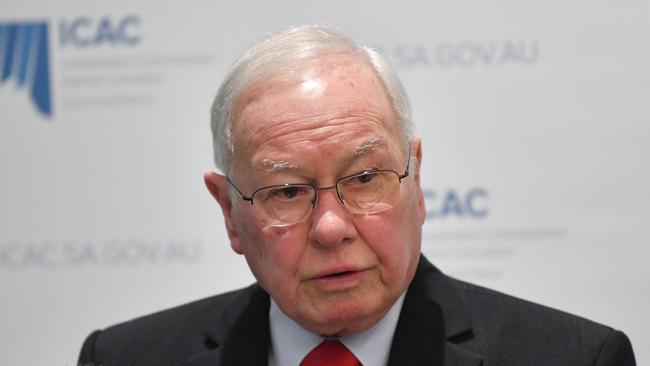Paul Starick: It’s time to slash council numbers and CEO pay packets
Anti-Corruption Commissioner Bruce Lander wants to cap council chiefs’ pay. But there is an argument for much deeper cuts to save ratepayers’ cash, Paul Starick writes.
Opinion
Don't miss out on the headlines from Opinion. Followed categories will be added to My News.
- ICAC chief calls for council CEO salaries to be capped
- How to make the most out of your Advertiser+ subscription
One problem that South Australia certainly does not have is a lack of politicians, particularly at the local council level.
Our state of almost 1.7 million people has 68 councils, which have chief executive officers who earn up to $360,000 annually.
State Parliament has 69 members. Premier Steven Marshall earns $401,252 and his ministers get $351,096.
They lead a state of almost 1.7 million people, about 1.2 million of whom are required to vote at elections.
When considering the state also has 22 federal members, many would suggest we are overgoverned.
An excellent place to start slashing numbers would be at the local government level, even though it is supposedly closest to the people and can lay considerable claim to providing important services.

It’s reasonable to discuss both cutting the number of councils and their CEOs’ pay packets.
Several attempts at reform in the past 30 years have floundered, partly because they lacked the necessary ambition and scale.
There is a compelling argument, put forward yesterday by Independent Commissioner Against Corruption Bruce Lander, to limit council CEO pay rises to future rate increases.
“Perhaps a chief executive officer’s remuneration ought to be determined by reference to the rate revenue of the council so that the remuneration can be capped,” Commissioner Lander suggests.
Council CEOs are well paid.
A few examples: Playford $274,474 (max); Charles Sturt $326,525 (package); Walkerville $243,120 (package).
They run large enterprises – or not so large, in Walkerville’s case – but it’s hard to suggest their responsibilities approach those of state ministers, for example.
Greater transparency and a clearer method of determining salaries, as suggested by commissioner Lander, would be in the public interest.
Commissioner Lander also criticises council elected members for “weaponising the Code of Conduct to make complaints against one another’’.
These are people, usually elected with a few hundred votes at most, who are supposed to preoccupied with representing ratepayers’ interests on roads, rubbish, development and other grassroots matters.
Instead, they are too often obsessed with petty bickering, factionalism and empire-building.
At least state and federal politicians are more professional in these pursuits.
There are 537 councils Australia-wide. Of these, 68 are in SA.
A sample of other states: Queensland (population 4.7 million) has 77; Victoria (population 5.9 million) has 79; and Tasmania (population 509,000) has 29.
There were some mergers in SA in the 1990s.
For example, Charles Sturt was formed in 1997 by the merger of the cities of Hindmarsh Woodville and Henley and Grange.
But these were half-hearted when compared to the sweeping mergers controversially pushed through by the-then Victorian premier Jeff Kennett in the same era.
Councils will argue they share services across areas, such as rubbish collection, but they have substantially escaped the job shedding and cost-cutting that has swept through private enterprise in the years since the global financial crisis.
After all, rates to pay for these regimes can be raised with a vote by elected members, based on staff recommendations.
Too often, established orders at local councils are put in the too-hard basket and ignored. By raising the issues of CEO pay and self-indulgent elected member bickering, Commissioner Lander has opened important subjects that deserve extensive debate in the public interest.

